Startups are developing machines that can mimic the dexterity of the human hand, finding applications in manufacturing, agriculture and healthcare.
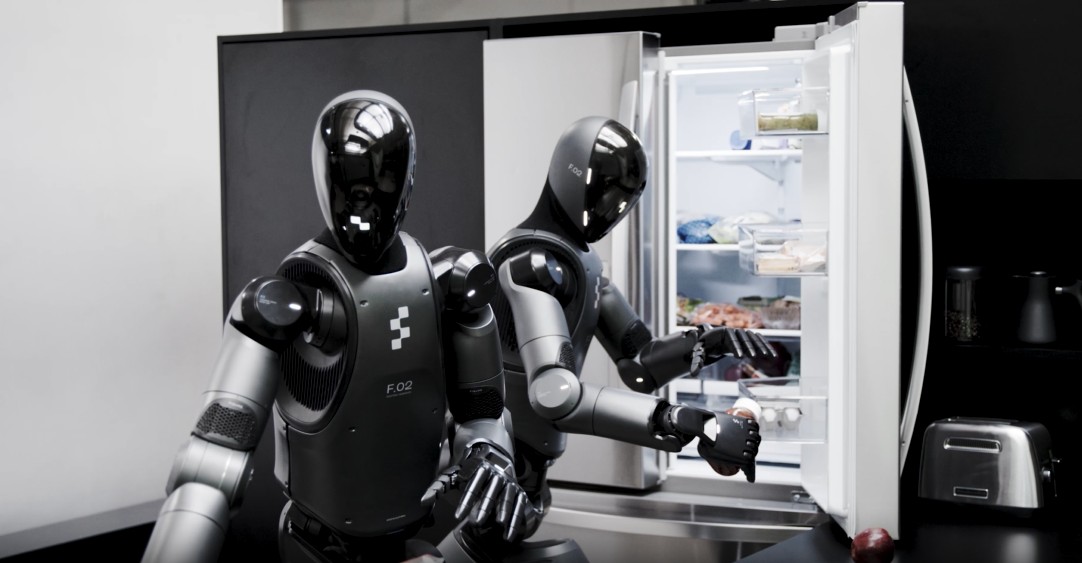
Robots are increasingly looking human-like these days. In 2024, 73% of robotics startups targeted humanoid designs, according to a Morgan Stanley report.
Many of these robots are powered by AI to be able to reason, learn and undertake tasks like humans. But one of the most complex parts of these designs is the robotic hand, one of the most technologically advanced components in the suite of humanoid features.
Startups are developing robotic hands that have similar gripping capabilities as humans. Aided with AI, machines can mimic human precision in complex tasks such as assembling tiny components that go into smartphones or harvesting delicate agricultural produce such as asparagus.
Here are nine startups that are at the cutting edge of developing robotic hands for use in the next generation of industry 4.0.
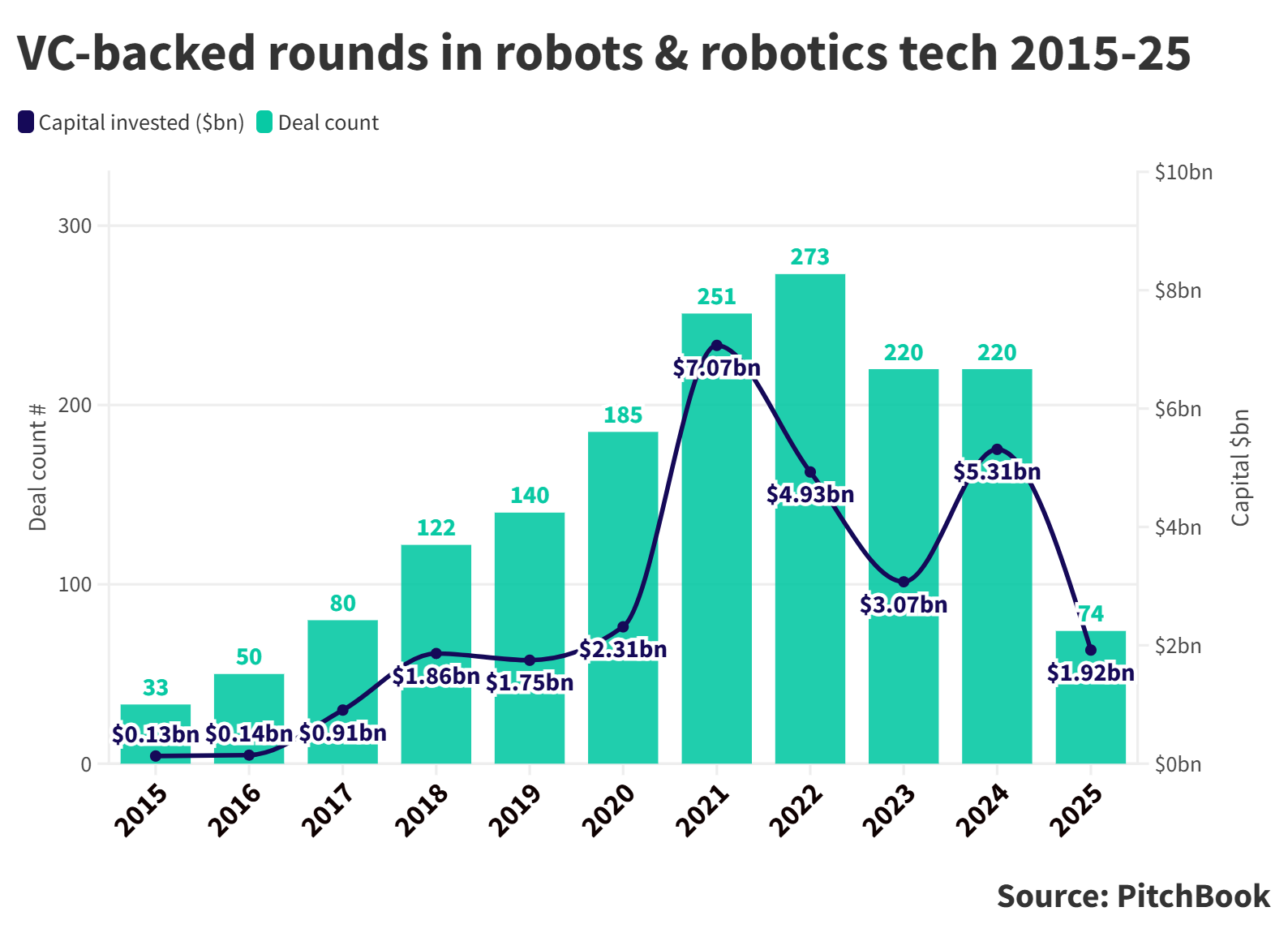
Inkbit
- Founded: 2017
- Funding to date: $63.8m
- Located: Massachusetts, US
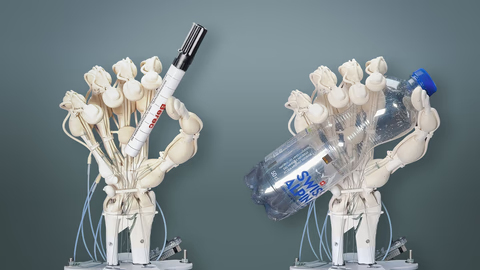
This US startup has developed a 3D printer that uses vision-controlled jetting technology to manufacture complex objects based on elastomers and polymers. These have properties ideal for making components for use in sectors such as robotics and drones.
The technology has printed a robotic hand, for example, that mirrors a human hand with bones and ligaments. The material has elastic properties that bounce back to their original state, making it suited for producing robotic hands with the kind of elasticity that human hands have.
In 2024, the startup raised $19m in a round led by Ingersoll Rand, a US supplier of industrial equipment. A mix of financial and corporate VCs participated in the round, including Future Labs Capital, GC Ventures America, iGlobe Partners, Ocado and Phoenix Venture Partners, Stratasys and Zeon Ventures, the CVC arm of Japanese chemicals producer Zeon.
Muddy Machines
- Founded: 2020
- Funding to date: $9.3m
- Located: UK
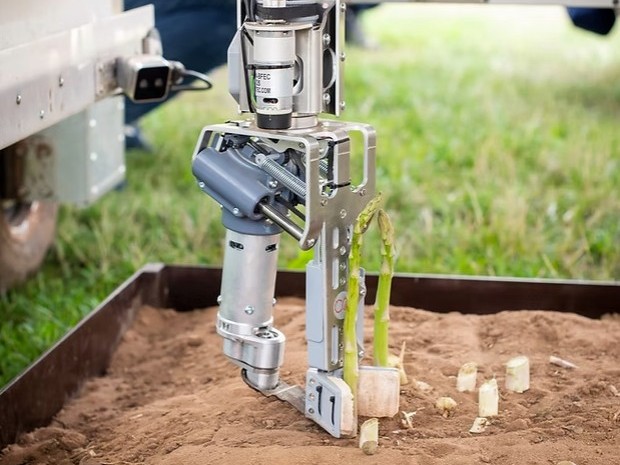
This robot manufacturer makes AI-powered machines for harvesting produce traditionally carried out by agricultural labourers. The UK company has a developed an asparagus harvester, for example, that uses AI to measure every single spear. The robot cuts ripe asparagus delicately while avoiding immature spears.
The machine runs on electricity, replacing picking carts that are traditionally run on fossil fuels. It also means growers have to rely less on human labour, which is becoming harder to find.
In April this year the startup launched a crowdfund to raise money to progress its robots from prototypes to production-ready units and expand grower trails in the UK. It initially raised £1.5m in seed funding in 2022, led by Regenerative Ventures, a VC specialising in agtech investments. Ponderosa Ventures and Thrive by SVG Ventures also participated.
DexRobot
- Founded: 2021
- Funding to date: undisclosed
- Located: China
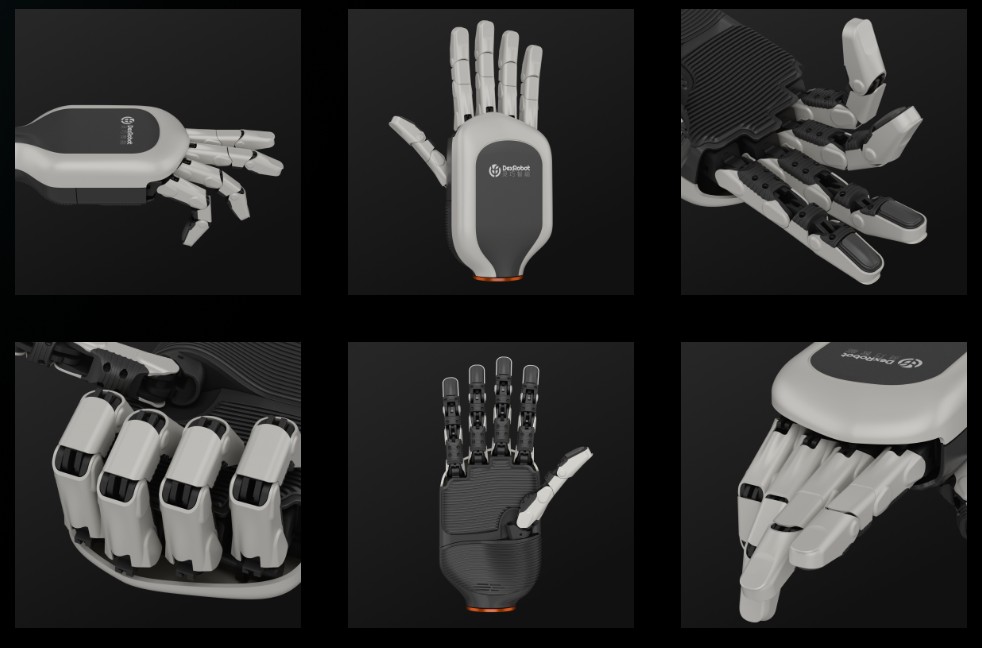
This company has developed a five-finger dexterous robotic hand that seeks to mirror the strength and mobility of human hands. The machine operates on low power and has ‘fingertips’ that can lift 1,000g. It supports more than 15 human hand operations such as cylindrical grasp, spherical grasp and multi-finger pinching.
The company was formed by alumni from the Research Institute of Robotics at Shanghai Jiao Tong University. It raised an undisclosed amount in May 2025 from CICC Capital, a fund management company which is part of state-owned China International Capital Corporation.
Figure AI
- Founded: 2022
- Funding to date: $745m
- Located: US
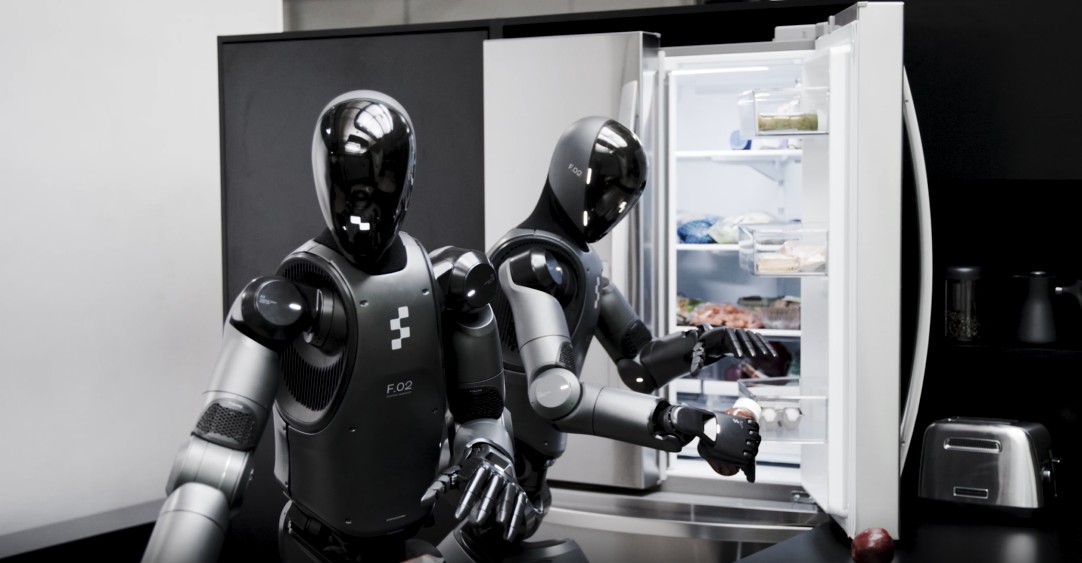
This human robot manufacturer has built a generalist humanoid machine that it claims can reason like a human. The robot, called Helix, uses a so-called vision-language-action model that combines perception, language understanding and learned control.
The company claims its robot is the first to have good control of the entire humanoid upper body, including wrists, torso, head and fingers. It can, for example, track its hands with its head while adjusting its torso to reach for objects. It can also maintain precise finger control for grasping.
Helix can pick up small objects, including those it has never encountered before, by following natural language prompts.
The company raised a $675m series B funding round in 2024, with several corporate investors participating including Microsoft, OpenAI Startup Fund, Nvidia and Intel Capital. Several news outlets have reported the company to be in talks to raise a further $1.5bn this year.
Mimic
- Founded: 2024
- Funding to date: $2.5m
- Located: Zurich, Switzerland
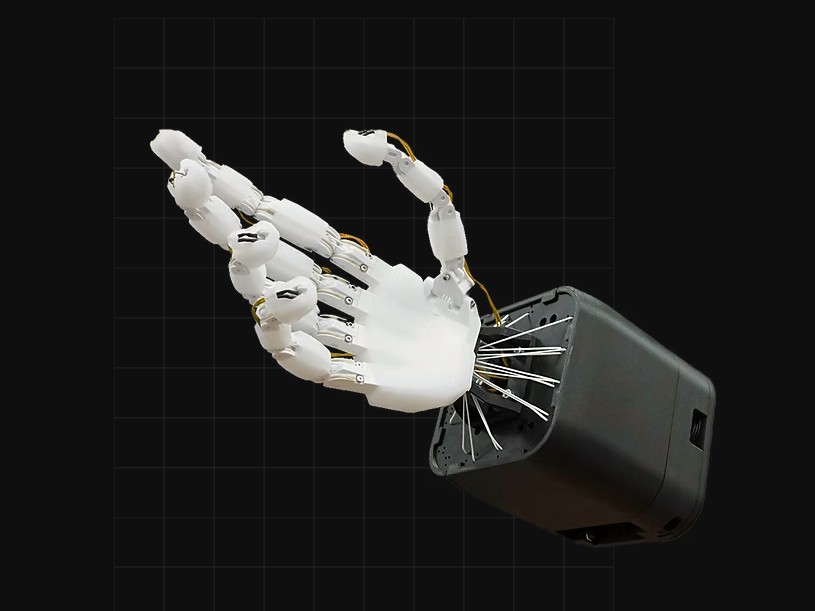
This spinout from Swiss university ETH Zurich has developed a foundation AI model that trains its robotic hand hardware on diverse, large scale human video data. The foundation model gives the humanoid hand the ability to learn and reason. Users can command the machine to do tasks with simple natural language commands.
The machine can handle tough work conditions as well as fragile objects, the company claims. It aims to sell to customers that want to automate complex and tedious tasks.
In 2024, the startup raised $2.5m in a pre-seed round led by Swiss investment company Founderful. UK investor Tiny Supercomputer Investment Company also participated.
Robot Era
- Founded: 2023
- Funding to date: $42m
- Located: China
This humanoid robotics startup was founded by Chen Jianyu, a doctoral supervisor and assistant professor at Tsinghua University in China. The startup has developed several different kinds of robots, including a five-fingered dexterous hand. The index finger has lateral movement which can be used for twisting movements such as unscrewing bottle caps. The thumb can be used to enhance the stability of grip.
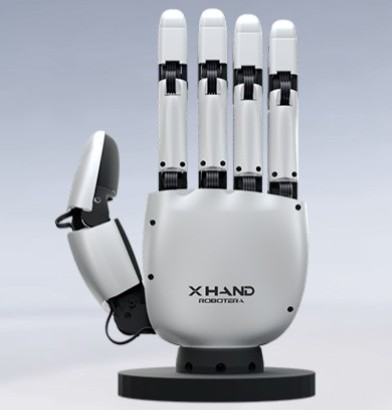
The company raised $42m in a pre-series A funding in 2024. Ecommerce platform Alibaba and venture capital firms Crystal Stream and Vision Plus Capital led the round. Lenovo Capital, the CVC arm of the Chinese consumer electronics maker, also invested.
The hand’s fingertips are equipped with high-resolution tactile sensors, which give the robot perception capabilities that can control how much force it applies to objects. Each haptic sensor also allows the robot to sense the temperature of objects it comes into contact with.
Tesollo
- Founded: 2019
- Funding to date: $4.2m
- Located: Incheon, South Korea
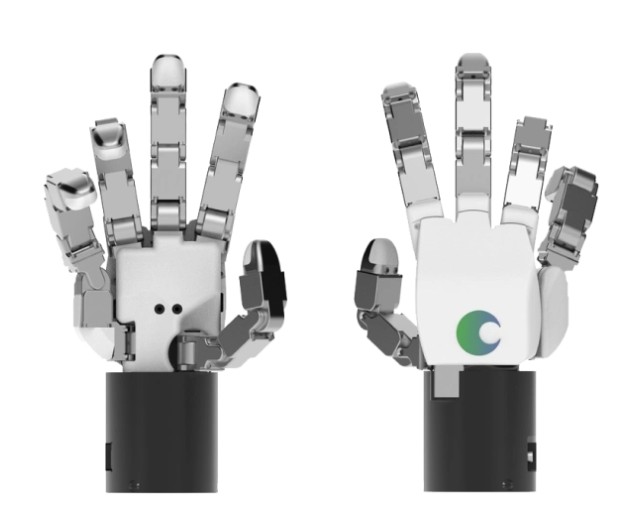
This Korean startup has made several iterations of a robotic hand, the latest of which features 20 independently controlled joints. The machine is similar in size to an adult male hand and is designed for human work environments, such as manufacturing, precision assembly and logistics. It can also be integrated with prosthetic technologies for use in medical devices.
It is programmed with various grip models, such as a pinch group that allows it to hold objects with fingertips, and a power grip that gives it a firm grasp with its entire hand.
It also has high-precision fingertip sensors that detect contact with surfaces and are aimed at preventing objects from slipping out of the hand and stopping it from exerting too much pressure.
The startup was selected to participate in Hyundai Motor Group’s ZEO1NE’s accelerator in 2022. It has been working with the Korean carmaker to develop factory automation solutions. The company raised a $4.2m series A funding round in March 2025 from investors including Samsung Ventures and Posco Venture Capital.
Prensilia
- Founded: 2009
- Funding to date: $1.35m
- Located: Italy
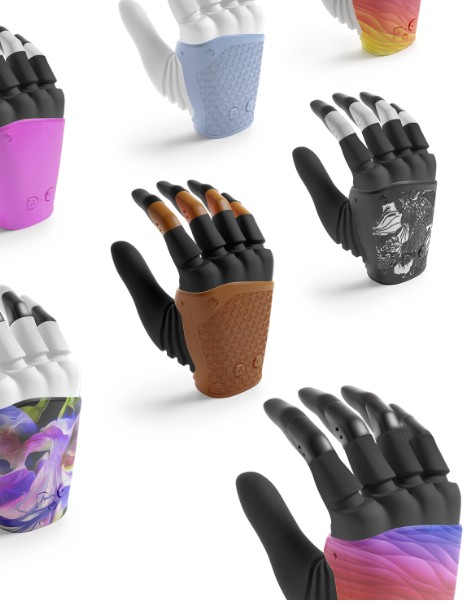
This spinout from Scuola Superiore Sant’Anna in Pisa, Italy, makes dual-use robotic hands that can be used as prosthetics as well as in industrial manufacturing. Its ‘Mia Hand’ is a myoelectric prosthesis, which is powered by electricity generated by human muscle. Its external features can be fully customised.
The company claims it allows the wearer to carry out 80% of daily activities. It has a fast-gripping motion and is also quiet, a critical feature in the widespread adoption of prosthetics.
The robotic hand can be configured for use in sectors such as food and beverage and precision manufacturing. Prensilia’s latest funding round was $1.09m in seed capital from a group of undisclosed investors.









